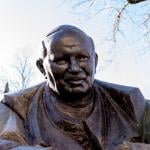EYTAN IN MARYLAND ASKS:
What do Unitarian Universalists believe about Jesus?
THE GUY ANSWERS:
All sorts of things.
Jesus is a perennial puzzlement for the 221,000-member Unitarian Univeralist Association (www.uua.org), which was formed by a 1961 merger of two liberal denominations. The 19th Century forebears unhesitatingly identified as Christians, though they rejected orthodox belief in Jesus Christ worshipped as the one savior from sin and God the Son in the Trinity. By today’s standards it’s hard to believe that the 1853 declaration of the American Unitarian Association deemed Jesus’ teachings “infallible” and echoed the New Testament in declaring: “We believe in Jesus Christ, the everlasting Son of God, the express image of the Father, in whom dwelt all the fullness of the Godhead bodily, and who to us is the Way and the Truth and the Life.”
By the turn of the century, says eminent historian Martin Marty, these churches had become “part-theistic, part-humanistic.” As rationalism, skepticism, and pluralism gained leverage, the less-than-divine Jesus became less than interesting for many. Hymns had to be rewritten; for instance the well-known “All Hail the Power of Jesus’ Name” became “All Hail the Power of Truth to Save.” Demonstrating how delicate the Jesus issue is nowadays, the official “Unitarian Universalist Principles” do not name the Nazarene even as they quote him, stating that sources the UUA “draws from” include “Jewish and Christian teachings which call us to respond to God’s love by loving our neighbors as ourselves.”
Though that phrase mentions God, the UUA welcomes atheists as well as, for instance, the “Unitarian Universalist Pagans,” an officially chartered caucus since 1987 with 107 U.S. chapters. (Notably, the small “Unitarian Universalists for Polyamory Awareness,” which wants clergy blessings for polyamorous unions, is not chartered.) There’s also a “Unitarian Universalist Christian Fellowship,” with 60 U.S. chapters. One congregation in this faction, venerable King’s Chapel in Boston, states that it worships “in the love of truth, and the spirit of Jesus Christ.”
Jesus remains a person of interest in some materials issued by the UUA. Doug Muder, a columnist for the denominational magazine (and boyhood Lutheran), observes that Christianity is “a persistent minority point of view” and often “the unmentioned elephant in the room…. Say much of anything — positive or negative — about Jesus or the Bible and many UUs will look at you like you just let out a loud belch.” Muder probably speaks for many in concluding with perplexity, “I still don’t know what to do with Christianity. When I try to embrace it, it runs away from me. When I reject it, it comes back.”
If Muder is correct that the UUA majority is not Christian, nonetheless there is talk of the human Jesus as a helpful example or social reformer. Some congregations study a book about “rediscovering Jesus” that calls him a “teacher, guide, companion.” In a British Unitarian pamphlet offering varied opinions about this question, one contributor explains, “When I look at Jesus I am not, in fact, seeing God. Instead I am seeing a reflection of God — perhaps a perfect reflection — and in this sense I see Jesus as divine. What I deny is the DEITY of Jesus. I don’t believe Jesus is God.” That’s probably so for many who still accept the “Christian” label.












